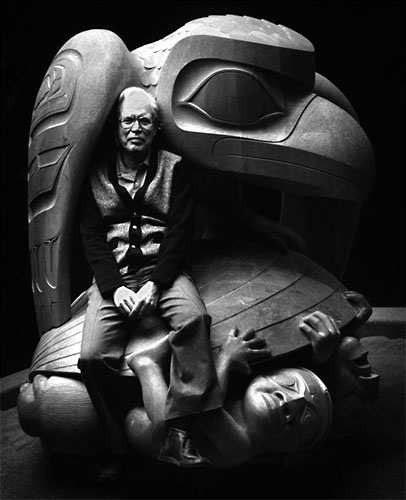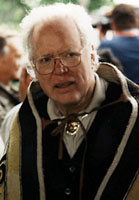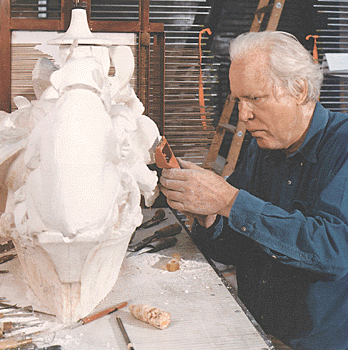Bill Reid
Bill Reid, OBC (actually William Ronald Reid, born January 12, 1920 in Victoria, † 13 March 1998) was a Canadian artist who shaped by European influences further developed the art of the Haida. His father had German and Scottish ancestors, his mother was a member of the Haida. Great influence was thereby the father of his mother, who also belonged to the Haida. He in turn had learned from the Haida artist Charles Edenshaw. A certain influence exerted also Mungo Martin, who worked for ten days with Reid.
Biography
In Toronto, Reid worked as a radio announcer, but returned in 1951 back to British Columbia. In Vancouver, he promoted the conservation of totem poles, dealt with Edenshaws art and worked in the reconstruction of a village by the ethnological department of the University ( Museum of Anthropology ) with.
Reid combined traditional forms with materials such as precious metals and argillites. He began with jewelery and soon ventured to larger sculptures in bronze and wood of certain native tree species, especially the giant tree of life and the Nootka cypress ( Callitropsis nootkatensis ). He was referring to the mythology of the Pacific Northwest Coast.
As part of a change in the law allowing children of Indian mothers to be recognized as an Indian within the meaning of the Indian Act ( Indian Act ), made a request Reid. He was, though initially only the children of Indian fathers had the right to also formally recognized as an Indian.
His best known works are two large bronze sculptures, one of which at the Canadian Embassy in Washington, DC stands, the other in the Vancouver airport. The former, designed in black, was named The Spirit of Haida Gwaii, the spirit of Queen Charlotte Islands, which are called in the language of the Haida Haida Gwaii, known as The Jade Canoe latter, the Jade Canoe, a green work of art.
Reid was active politically in the protection of the later Gwaii Haanas National Park, on the southern Moresby Iceland, which belongs to the Queen Charlotte Islands. He also interrupted his work, as the deforestation of local rain forest to begin.
Reid was awarded a prize in 1994 for services to the Aboriginal culture, the National Aboriginal Achievement Award, and became a member of the Order of British Columbia.
He died in 1998 from Parkinson's disease. In July rowed friends Reid's corpse in a canoe, which he himself had carved for Expo 86, by Tanu Iceland in Haida Gwaii, where the village had stood his mother.
The Canadian 20 dollar note now bears an image of the Spirit of Haida Gwaii.










